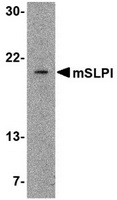Slpi Rabbit Polyclonal Antibody
Other products for "Slpi"
Specifications
| Product Data | |
| Applications | WB |
| Recommended Dilution | WB: 2 ug/mL |
| Reactivities | Mouse |
| Host | Rabbit |
| Isotype | IgG |
| Clonality | Polyclonal |
| Immunogen | SLPI antibody was raised against a 17 amino acid peptide from near the center of mouse SLPI. |
| Formulation | PBS containing 0.02% sodium azide. |
| Concentration | 1ug/ul |
| Purification | Affinity chromatography purified via peptide column |
| Conjugation | Unconjugated |
| Storage | Store at -20°C as received. |
| Stability | Stable for 12 months from date of receipt. |
| Gene Name | secretory leukocyte peptidase inhibitor |
| Database Link | |
| Background | Secretory leukocyte protease inhibitor (SLPI) is produced at mucosal surfaces, primarily the upper respiratory tract and is thought to play an important role in the antiprotease defense mechanism of the lung. SLPI forms inhibitory complexes with numerous proteolytic enzymes such as neutrophil elastase, and has been shown to possess anti-inflammatory, anti-viral, and antibacterial activities. Its expression in oral epithelial cells is stimulated by HIV-1 gp120, suggesting that SLPI is a component of the oral mucosal response to HIV-1. In peripheral blood monocytes, SLPI can inhibit NF-kB activation by inhibiting IkB degradation in the cytoplasm and competing for NF-kB binding sites in the nucleus. This attenuation of the inflammatory response may also act to suppress liver metastases and other cancer cell invasions, but promote blood-borne metastasis via an invasion-independent pathway. |
| Synonyms | ALK1; ALP; antileukoproteinase; BLPI; HUSI; HUSI-1; HUSI-I; MPI; WAP4; WFDC4 |
| Reference Data | |
Documents
| Product Manuals |
| FAQs |
{0} Product Review(s)
0 Product Review(s)
Submit review
Be the first one to submit a review
Product Citations
*Delivery time may vary from web posted schedule. Occasional delays may occur due to unforeseen
complexities in the preparation of your product. International customers may expect an additional 1-2 weeks
in shipping.






























































































































































































































































 Germany
Germany
 Japan
Japan
 United Kingdom
United Kingdom
 China
China



